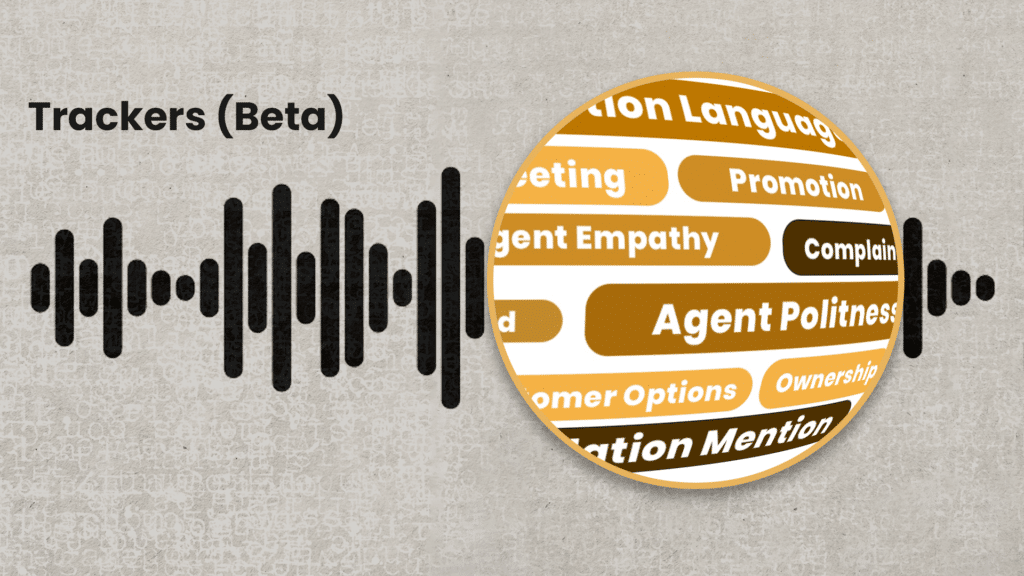Track key phrases, custom intents, and business insights more accurately using Symbl.ai’s Trackers — now in beta. Trackers are designed to recognize contextual similarities, rather than exact keyword matching, making it easier for developers to build deeper and more sophisticated domain specific intelligence at scale.
Symbl.ai is thrilled to unveil its latest stride in conversation intelligence with the beta release of Trackers. Developers can now easily create and implement custom Trackers to detect domain and business specific intents and insights through the recognition of contextual similarities in human conversations. Trackers are powered by Symbl.ai’s Contextual Understanding Engine (CUE), and eliminates all dependencies of exact keyword matching.
The Tracker API propels Symbl.ai into the next phase of its objective in further enabling contextual comprehension in any and all verticals, by making it easier and faster for developers to build deeper and more sophisticated domain specific intelligence at scale.
Trackers are now available in beta and support both real-time as well as asynchronous voice and video channels.
Why Trackers?
One of the biggest challenges of using traditional keyword or phrase tracking is that most NLP algos are dependent on exact matches. Different individuals may be making contextually similar statements without using the exact same words or phrases, making exact keyword matching ineffective. For example, “I ran out of budget” is contextually similar to “I don’t have any money,” and both statements convey the same inherent meaning.
Furthermore, human conversations are highly unstructured, tracking key insights at scale presents an array of challenges. As more speakers are introduced, each making contextually similar statements with different words and structure, it becomes infeasible for tracking models that rely on exact keyword matches. The alternative may be to leverage existing intent identification APIs, but they are often rigid and rely on narrow logic designed to only recognize common sentence structures, ignoring the context of the entire conversation.
Trackers are created to recognize contextual similarities at scale, presenting a new and easy way to track custom intents by configuring key-value pairs with a few example keywords, without requiring any training data.
Applying Trackers
Trackers are designed to be domain agnostic, and are fully configurable to be applied to any conversation-driven use case so that businesses can get more granular information from calls, videos, audio files and build use cases like real-time tracking, compliance, content moderation, building custom call quality scores or even real time alerts that can be personalized to a person, business or domain. Consider the following examples:
- Delightful Insurance Inc. is looking into improving customer satisfaction with their support agents. The “Negative Phrases Tracker’ was created to track all customer support calls to detect the frequency in which support agents and/or were using contextually similar negative phrases such as, “This makes me uncomfortable,” “My problem is,” “Can I put you on hold,” etc…
- ABC Holidays, a curated holiday booking service, would like more insights into which activities are more likely to result in bookings. Various ‘Activity Trackers’ can be set up for outdoor activities, food tours, history walks etc… to track the frequency of bookings being made when customers and/or agents mention contextually similar phrases and words that match each of the Activity Trackers.
The amount of use cases where Trackers can be applied are vast, and some of our early customers and developers have found success using them to improve agent politeness, increase customer satisfaction, monitoring upsell potential, and many more.
Getting Started with Trackers
Trackers is now available in beta, via the Symbl.ai Management API. It’s available for consumption by any developer with a Symbl.ai account.
- Using the POST Tracker endpoint, create and set up your tracker by providing a few example keywords and phrases
- Once your Trackers are activated, you can start detecting and retrieving insights through the GET Tracker endpoint
- Other configuration and management options are available through the Management API’s REST interface. Click here to learn more about the capabilities of Management APIs
Currently, Trackers are supported with Symbl’s Async APIs and Streaming API, enabling it to be integrated with any voice, audio, or text conversation streams and formats.
To start testing Trackers, you must have a Symbl.ai account (sign-up here for free). As always, we’d love to hear your feedback. If you want to actively participate in iteration or other experimental features, join #beta in our slack community
